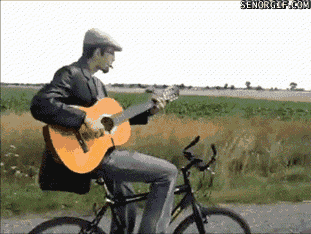Riding a bike is like…
well…
riding a bike.
Once you get the hang of it, it’s a skill you have for your entire life. This simple truth applies to riding a bicycle as well as learning to play a musical instrument.

But learning music is like riding a bike in more ways than one.
Putting into practice what I’m about to tell you will help your child get to the point where they have that life-long skill of understanding, appreciating, and making music.
Starting with Training Wheels
Remember back to when you were learning to ride or you were helping your kid learn to ride a bike? Maybe you started on a tricycle or you used training wheels. The extra wheels helped your kid learn the basics of balance, pedaling, steering, and braking with extra support. Eventually you don’t need the support. You learned how to ride a bike. And now you’re able to ride a bike for the rest of your life.
Your child needs that same kind of support when they’re starting out with individual music lessons or group music classes. And they go through a similar journey when learning music as someone does when they learn any new skill.
So what kind of “training wheels” do you use when it comes to learning music?
The OMA Training Triangle
At Oregon Music Academy, we use something we call the OMA Training Triangle to illustrate this concept. It consists of three parts: Your kid, you, and OMA. Following our bicycle metaphor, you and OMA are the training wheels. Let’s take a closer look at how this works:
Your Kid
Your child’s interest and enthusiasm for music are probably what steered you toward getting them started with music lessons and classes. Our job as “training wheels” is to help keep your child moving in that direction even as their interest and enthusiasm wavers a bit.
By the way, this wavering in interest and enthusiasm is a natural part of learning something as well as simply being a kid. We fail as “training wheels” if we let them stop their forward progress when they hit a little bump in the road or encounter a small hill that requires a bit more effort to climb. If we’re doing our job as training wheels consistently over the long term, your child is going to eventually be practicing and playing on their own. And they’ll grow into a musical adult.
You
Starting off, your child is going to need your support and guidance with consistent at-home practice. That support may be finding ways to help them integrate daily practice into their daily routine. It may be listening to them make music and offering encouragement. It may be telling them how proud you are of them for sticking with it.
Over time, the amount and type of support and encouragement is going to look different. Eventually, your kid is going to be practicing and making music on their own. At some point, your role will be showing up for concerts and applauding with the rest of the audience as your child wows everyone with what they’ve learned.
OMA
The Oregon Music Academy point on the triangle consists of a positive, patient, and professional teacher. Also key to success is our structured and flexible curriculum and methods designed for your child’s unique goals and learning style. Last, but not least, you’re connected to a friendly community of musical friends and their families.
Can You Pass This Quick Quiz?
One of the questions we like to ask parents, students, and teachers applying to be a part of OMA is:
Who is accountable for your child learning music, loving music, and succeeding in music?
A: Your Kid
B: You, the Parent
C: OMA and their teacher
D: ALL of the Above
The right answer, of course is: ALL of the Above. It takes all 3 to get going with music.
If you got it correct, then you’re in good company here at OMA. If you haven’t started lessons yet, why not get to know us better?
